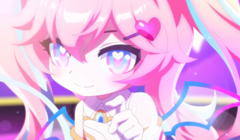In a recent incident, a female animator in South Korea, known as Darim, unveiled a character design for the famous game MapleStory. With pride, she shared it online but was soon bombarded with horrific messages, including threats to her life. The drama unfolded after gamers took offense to a specific gesture, mistaking it for a feminist sign aimed at mocking men. What should have been a celebrated contribution instead turned into a nightmare, revealing how deeply rooted misogyny is in the industry.
Darim, who initially thought her work would be appreciated, described the vitriol as “disgusting and inhumane,” with threats compelling her employers to remove her work. This incident reflects a worrying trend where male gamers hunt down women in the industry, equating any perceived feminist sentiment with ruining their lives. The backlash against feminism in South Korea has spread rapidly, with many women feeling insecure about openly identifying as feminists, despite the country having one of the widest gender pay gaps in the developed world.
Moreover, these patterns are not isolated. Names such as Jigu, a woman violently attacked simply for having short hair, emphasize the real world stakes of these digital witch hunts. In stark terms, the protests against feminism are intimately tied to perceptions of masculinity and entitlement. As the younger male demographic feels increasingly threatened by advancing female rights, incidents of intimidation and violence rise.
To combat this, individuals like Minsung Kim have established support networks for victims of anti-feminist attacks. Although there is hope in activism, the challenges are immense, with evidence showing women are silenced in workplaces and their identities dismissed in public spheres. The struggle for a safer environment where feminist values can be expressed freely continues, desperate for change within a rigidly traditional society.
Darim, who initially thought her work would be appreciated, described the vitriol as “disgusting and inhumane,” with threats compelling her employers to remove her work. This incident reflects a worrying trend where male gamers hunt down women in the industry, equating any perceived feminist sentiment with ruining their lives. The backlash against feminism in South Korea has spread rapidly, with many women feeling insecure about openly identifying as feminists, despite the country having one of the widest gender pay gaps in the developed world.
Moreover, these patterns are not isolated. Names such as Jigu, a woman violently attacked simply for having short hair, emphasize the real world stakes of these digital witch hunts. In stark terms, the protests against feminism are intimately tied to perceptions of masculinity and entitlement. As the younger male demographic feels increasingly threatened by advancing female rights, incidents of intimidation and violence rise.
To combat this, individuals like Minsung Kim have established support networks for victims of anti-feminist attacks. Although there is hope in activism, the challenges are immense, with evidence showing women are silenced in workplaces and their identities dismissed in public spheres. The struggle for a safer environment where feminist values can be expressed freely continues, desperate for change within a rigidly traditional society.



















